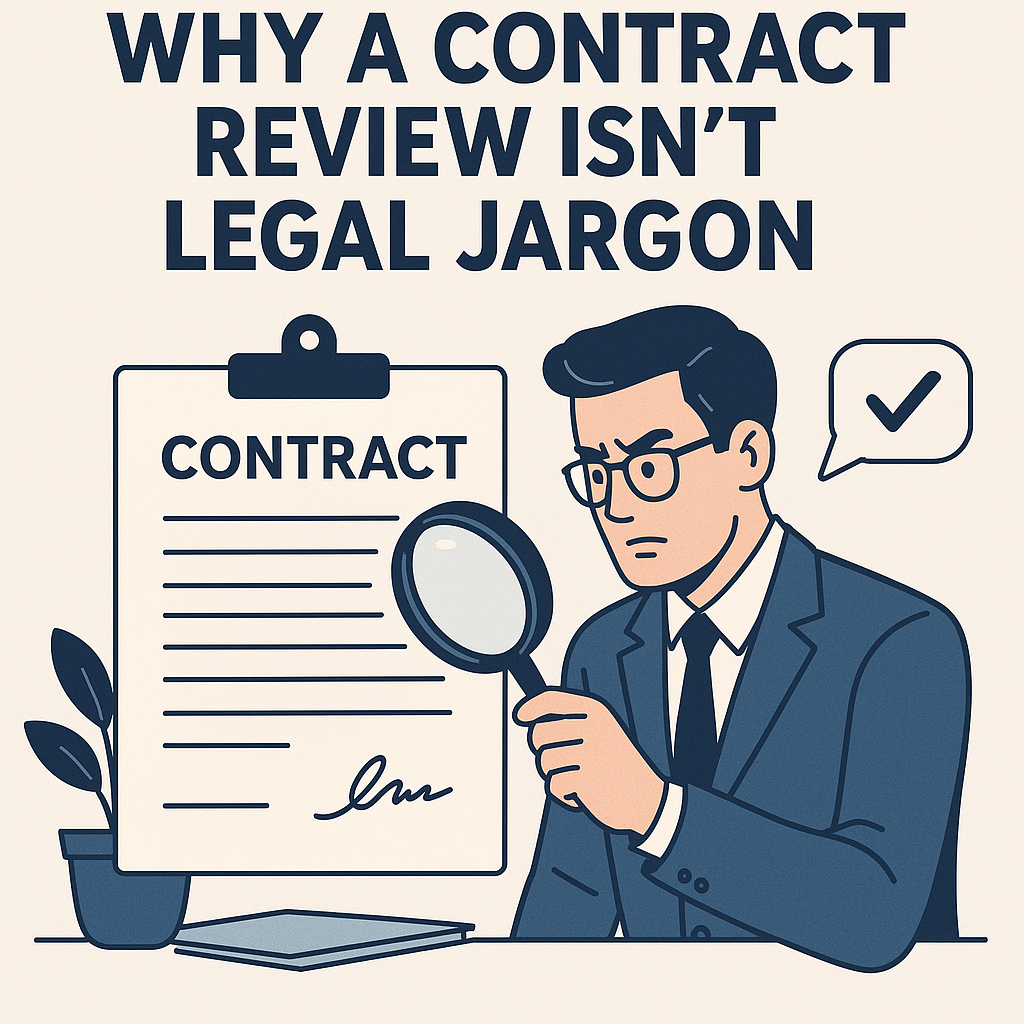Why a Contract Review Isn’t Just Legal Jargon
That bundle of pages (or lengthy email) sitting on your desk? It’s more than just words; it’s a contract, a legally binding agreement that will shape your rights and responsibilities. Whether it’s for a new job, a service you’re engaging, or a major purchase, understanding “What is a contract?” and, more importantly, how to review it, can save you from future headaches and potential pitfalls. If you’re facing a contract review soon, this 5-minute read is for you.
At its heart, what is a contract?
Think of a contract as a formal promise recognized and enforceable by law. For an agreement to be a legally sound contract, it generally needs a few key ingredients:
- Offer and Acceptance: One party makes a clear proposal (the offer), and the other party agrees to those exact terms (the acceptance). This creates a “meeting of the minds.”
- Consideration: This is the “something of value” that each party exchanges. It could be money, services, goods, or even a promise to do or not do something.
- Intention to Create Legal Relations: Both sides must intend for the agreement to be legally binding, not just a casual understanding.
- Capacity: The individuals or entities entering the contract must have the legal ability to do so (e.g., they are of legal age and sound mind).
- Legality: The purpose of the contract must be lawful. An agreement to do something illegal is not a valid contract.
While some contracts can be verbal (though harder to prove), most significant agreements are, and should be, in writing. This written document outlines the specific terms that govern the relationship.
Why Bother with a Thorough Review? It’s Your Shield and Your Guide.
Skipping a careful contract review is like navigating a new city without a map – you might eventually get somewhere, but you could easily get lost, taken advantage of, or end up in a place you didn’t intend. Here’s why dedicating time to review is crucial:
- Understand Your Obligations: What exactly are you agreeing to do or provide? What are the deadlines? What are the standards you need to meet? Clarity here prevents accidental breaches.
- Know Your Rights: What are you entitled to receive? What happens if the other party doesn’t hold up their end of the bargain?
- Identify Risks and Liabilities: Are there clauses that put you at a disadvantage? What are the consequences if things go wrong? Look out for indemnity clauses (where you might have to cover the other party’s losses) and limitations of liability.
- Spot Ambiguity and Errors: Vague language is a breeding ground for disputes. Ensure terms are clear, consistent, and accurately reflect what you’ve discussed. Even minor typos can sometimes lead to major misunderstandings.
- Ensure Fairness and Compliance: Does the contract comply with relevant laws and regulations? Are the terms balanced, or do they heavily favor one side?
- Prevent Future Disputes: A well-understood and clearly worded contract minimizes misunderstandings and provides a framework for resolving disagreements if they do arise.
Red Flags: Common Pitfalls to Watch Out For During Your Review
As you delve into the document, keep an eye out for these common traps:
- Vague or Undefined Terms: Phrases like “reasonable efforts” or “timely manner” can be subjective. Seek clarification or more specific language.
- Automatic Renewals (Auto-Renewals): Be aware if the contract renews automatically without your explicit consent and know the window for opting out.
- Termination Clauses: Understand how and when the contract can be ended by either party. Are there penalties for early termination? How much notice is required?
- Dispute Resolution: How will disagreements be handled? Will it be mediation, arbitration, or litigation? Where will these proceedings take place?
- Unfavorable Payment Terms: Are payment schedules clear? Are there late payment penalties?
- Scope Creep: Ensure the scope of work or services is clearly defined to avoid demands for additional work not originally agreed upon.
- One-Sided Clauses: Look for terms that disproportionately benefit the other party, such as unilateral rights to change terms.
- Ignoring the “Boilerplate”: Don’t skim over the standard-looking clauses at the end. Sections on governing law, entire agreement, and notice provisions are important.
Making Your Review Effective:
- Read Everything: Yes, every single word, including attachments and exhibits.
- Take Your Time: Don’t rush. It’s better to delay signing than to agree to unfavorable terms.
- Ask Questions: If something is unclear, ask for clarification. It’s your right.
- Negotiate: Many contract terms are negotiable. Don’t be afraid to request changes that better protect your interests.
- Seek Legal Advice if Needed: For complex or high-stakes contracts, consulting with a legal professional is a wise investment. They can identify risks you might miss and help you negotiate more favorable terms.
Taking the time to thoroughly review a contract isn’t just a formality; it’s an essential step in protecting your interests and ensuring a smooth and successful agreement. Armed with a better understanding of what to look for, you can approach your next contract review with confidence.
If you have any contract review needs, you are welcome to contact WHYFIRM. Our Smart Contract service will definitely meet your needs.

